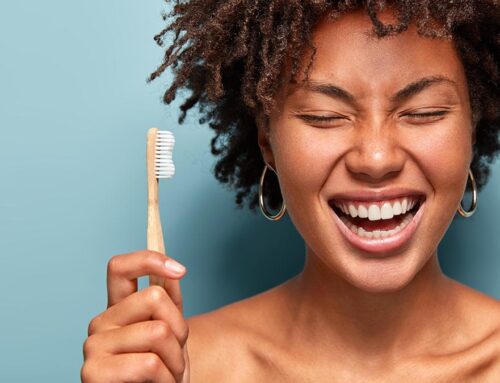Teeth grinding is the main sign of a condition known as bruxism. This painful condition, and the symptoms due to severe teeth gnashing and clenching include concerns such as: headaches, jaw pain and damaged teeth.rnrnGrinding is an issue that challenges more than 10% of adults, and a concerning 15% of children. If you or a family member grind their teeth, this can lead to, not only the above specified concerns, but long-term problems as well.rnrn[b]Understanding Bruxism[/b]rnrn[b]Concerns Beyond Your Teeth[/b]rnIn most cases, bruxism is mild. But when the grinding becomes frequent and severe, it can aggravate the joints in your lower jaw. These joints are known as the temporomandibular joints, or TMJs.rnrnConstant grinding can lead to pain or tightness in the joint area, and even earaches and headaches.rnrnIn addition, this bad habit can wear down your enamel, cause increased tooth sensitivity, and result in chipped or broken teeth.rnrn[b]The Link To Stress[/b]rnRegardless of if you have a child who grinds, or are an adult who grinds, grinding one’s teeth is often a result of stress, anxiety or frustration.rnrnIn addition, teeth grinding is associated with certain competitive or highly determined personality types.rnrnCommonly also, if your teeth are misaligned and your muscles are pulling your jaw into an unnatural position, you may end up grinding your teeth.rnrnThe full scope of factors that leads to teeth grinding is still under study, but those are some of the initial ways a dental professional might begin to uncover the ‘why’s’ behind an individuals grinding habit.rnrn[b]Seen But Not Heard[/b]rnIf this problem is unbeknownst to you, it is because it commonly happens while you are sleeping.rnrnHowever, if you have unexplained facial pain, earaches or headaches, or tenderness around the jaw joint, you could be grinding without knowing it. Often, it’s a sleep partner who will complain about being disturbed during the night by the hair-raising sound of constant grinding. Or a parent listening in on their child, or seeing the results of it on their teeth.rnrn[b]Children – The More Common Case[/b]rnAs mentioned, up to 15% of children grind their teeth, and some studies even put that figure as high as 38%.rnrnHowever, this does not have to mean your child is stressed out.rnrnYour child may grind their teeth when they are coping with earaches or teething, or it may be related to their jaw and tooth growth and development.rnrnStudies reveal that, kids who drool at night, talk in their sleep, or have a psychological disorder, are more likely to grind their teeth. Bruxism actually runs in families, but the good news is – is that children who grind their teeth usually outgrow it by adolescence.rnrn[b]Treatment[/b]rnIn most cases, no treatment is needed. But if the problem is severe, there are ways to prevent one from grinding their teeth.rnrnA common and very successful approach is a plastic mouth guard. This guard fits over your teeth and reduces or eliminates damage from grinding during sleep. It will also ease the associated joint pain.rnrnIf you notice yourself grinding or clenching your teeth during the day, make a point of relaxing your jaw with your mouth closed and your teeth apart.rnrnAs your West Vancouver Orthodontist, we want to ensure your oral health is addressed, but also that you take stock of any stress in your life that might be causing you dental concerns. If you are seeing the effects of your stress through this grinding concern, it is well worth finding some ways to reduce your stress levels, and maintain your oral and mental health.rnrnInternal health is often reflected in your external health. Dr. Bryan Hicks and his orthodontic team wish you COMPLETE health!rn




